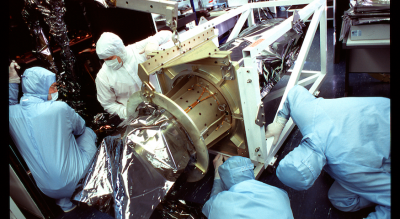The effect that the Sun has on the Earth through causing changes to the atmosphere and magnetosphere that can ultimately disrupt our communications, navigation and electricity distribution systems.
Space weather is the term used to describe the effect that the Sun has on the Earth through causing changes to the atmosphere and magnetosphere that can ultimately disrupt our communications, navigation and electricity distribution systems. The UK has a space weather forecasting centre (Met Office Space Weather Operations Centre), space weather appears as number 4 on the UK civil risk register and businesses are increasingly including space weather in their continuity planning. MSSL has research and engineering teams that have, for many decades, been developing our understanding of the science behind space weather and we work to promote space weather dialogue and knowledge dissemination amongst those adversely affected. We also design satellite instrumentation and develop techniques that can help improve space weather forecasts. Overall, MSSL has built a significant programme in the area of space weather which includes fundamental research, instrumentation and mission concept development, and sector specific training.
Research to operations
We work with the Met Office Space Weather Operations Centre to ensure that our fundamental research can be translated into tools that will improve space weather forecasting. Our tools are fast to run and complementary to work being done by other groups in the UK, such as the British Geological Society (BGS). In one collaboration with BGS, we are developing machine learning models that take solar wind data captured by spacecraft and use these data to predict so-called sudden storm commencements, which lead to induced currents that pose a risk to power distribution networks, rail networks and other long electrical conductors. These models could potentially provide a 3-day warning for adverse space weather. We are also working on projects to improve our understanding of how space weather forecasting can protect our satellites. For example, satellites are negatively affected by energetic electrically charged particles trapped in the Earth’s magnetic field (in the radiation belts) and we are working to improve national forecasting techniques through developing a radiation belt model. During space weather events, the Earth’s aurora evolves with time and we are using auroral data to improve the effectiveness of an internationally used model known as ‘Ovation’ so that it performs accurately at both quiet and active times. This will enable space weather forecasters at the Met Office to better understand how to interpret Ovation model results.
We work closely with ESA to support their space safety programme and are providing input to their Space Radiation Expert Service Centre. We provide a thermal electron magnetospheric population model that is used by spacecraft operators and providers and which is freely available on ESA’s website once an account has been created.
Missions and instrumentation
In our space weather programme we also work closely with industry to support the award of European Space Agency contracts in activities such as the D3S programme, Distributed Space Weather Sensor System programme, that will monitor the Earth’s interaction with the Sun and the resulting changes to the space environment around the Earth. Europe’s next dedicated space weather sentinel is called Lagrange, in recognition of the satellite’s location at the L5 point that trails the Earth in its orbit around the Sun. MSSL scientists and engineers played a leading role in defining the payload for the Lagrange spacecraft and we are now building the solar wind analyser that will be carried onboard.
Sector Specific Training
We have developed and run bespoke training sessions that aim to raise sector-specific awareness of the space weather. Providing insights to the mechanisms behind space weather phenomena, and the data sets used to observe and their impact. These training sessions are ideal for space weather forecasters and users of space weather forecasts as well as businesses looking to improve their resilience to space weather.
Business resilience and continuity planning
MSSL’s activities in the area of space weather extend beyond research and engineering to working in partnership to support the development of policies and practice that help build preparedness for disruptions due to space weather. In this area we work closely with UCL’s Institute for Disaster and Risk Reduction. We have worked for many years discussing space weather with government departments, the Met Office Space Weather Operations Centre and national and regional agencies and organisations. We aim to build a deepening understanding of the origins and impact of space weather that can inform policy development, help organisations understand what space weather means for them and develop guidelines and action plans for space weather resiliency planning.
Space weather impacts can be wide-ranging and hard to determine and although space weather forecasts are issued by the Met Office Space Weather Operations Centre, specialist knowledge is often needed to interpret these forecasts and put them to practical use. In light of this, we collaborate with UCL’s Institute of Risk and Disaster Reduction to support organisations in building sector-specific knowledge of space weather and its associated risks into their resiliency and continuity planning. We achieve this through roundtable events and workshops that build dialogue and enable is to understand stakeholder needs.
The following reports from previous events are available to download:
Green, LM; Deighton, R; Baker, D; (2016) Building space weather resilience in the finance sector. UCL Department of Space and Climate Physics: London, UK.
Wicks, R; Pescaroli, G; Green, L; Turner, S; (2019) Organisational Resilience for Severe Space Weather. (UCL Special Report 2019-01). UCL Institute for Disaster and Risk Reduction: London, UK.
Pescaroli, G; Green, LM; Wicks, RT; Turner, S; Bhattarai, S; (2019) Cascading effects of global positioning and navigation satellite service failures. UCL Institute for Disaster and Risk Reduction: London, UK.
For more information contact Lucie Green
 Close
Close


